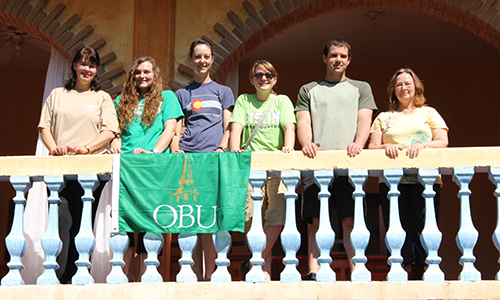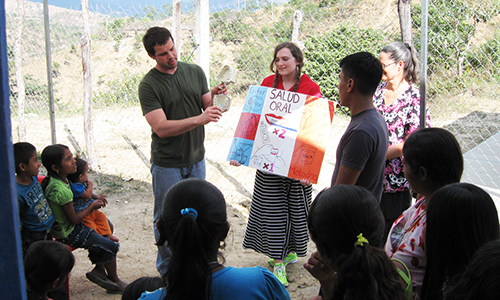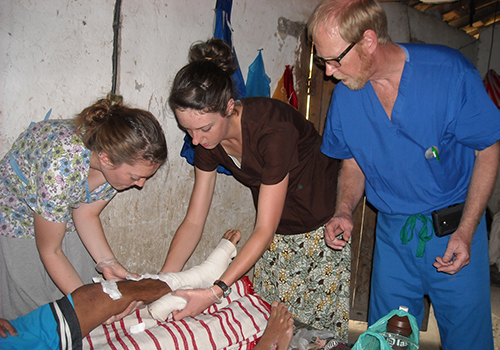Nursing Majors Share God's Love, Medical Care in Mexico
January 30, 2013
The La Mixteca region of Mexico boasts great geological contrasts, with mountain ranges to the north, ravines to the east, valleys to the west and the Pacific Ocean to the south. For OBU nursing majors, a January intercultural service trip to the region provided great contrasts as well: an abundance of opportunities to share God's love and basic hygiene practices with hospitable people, coupled with the constraints of multi-lingual communication and limited medical care.
The rugged, varied geography hindered communication among the Mixtec people groups over time, creating a great differentiation of dialects within the Mixtec culture. An estimated 12 or more different Mixtec languages exist.

OBU's volunteer nursing team pauses on the porch of the Corban Clinic in Mexico in January. The team included (from left) Dawn Westbrook, assistant professor of nursing; Brandy Moore, a senior from Mansfield, Texas; Alex Whelan, a senior from Parachute, Colo.; Christensen, a junior from Cañon City, Colo.; Jonathan Phillips, a senior from Exeter, Calif.; and Martha Hernandez, assistant professor of nursing.
Communication was one challenge for the OBU team, comprised of four nursing majors: Alex Whelan, a senior from Parachute, Colo.; Emily Christensen, a junior from Cañon City, Colo.; Jonathan Phillips, a senior from Exeter, Calif.; and Brandy Moore, a senior from Mansfield, Texas. The group was sponsored by OBU faculty members Martha Hernandez and Dawn Westbrook, assistant professors of nursing.
"We were very far south and were in a beautiful mountainous area," said Whelan, who has been to Mexico more than a dozen times on intercultural service trips, but not to this same area. "While working at the established clinic, we were right on the beach, but during our village trip we were way up in the mountains."

OBU nursing students Jonathan Phillips (left) and Brandy Moore present an oral-health teaching project at a village clinic in Mexico.
The OBU team joined forces with an existing working group to serve alongside cross-cultural workers in an established clinic. The students also were part of a large group that traveled into remote mountain villages to set up clinics in communities with very limited access to medical care. They had an opportunity to work alongside 2012 OBU graduate Aubrey Dolliver, who obtained her nursing license and now ministers full-time at the site.
"We had the overall goal of keeping Christ first and sharing his love to all we encountered," said Christensen. "We also had to goal to use our skills that we have been gaining in nursing school to help the communities we were in contact with in Oaxaca. We did a three-day village trip where we set up portable clinic sites to see the people in the villages. Our goal with this was to help relieve their physical ailments. Afterward, we would pray with them and tell them about Jesus."
The villages the team visited lie about five hours away from most modern services, Whelan said. The local people speak a dialect different from Spanish, and the local culture varies from much of Mexico. The people dress differently and work to grow food to sustain their families. With meals comprised mostly of beans and tortillas, the medical team encountered a lot of nutritional deficiencies in the local people. In addition to addressing medical needs, the team had prepared a health teaching project about dental hygiene which they shared in several churches, as well as during the clinics.

OBU nursing students Emily Christensen (left) and Alex Whelan provide medical care to a man in Mexico under the direction of Dr Douglas Holte, a family practice physician from Broken Arrow, Okla., who serves as a medical volunteer.
The most difficult part of the trip was the language barrier, she reported. Because the local people did not speak Spanish, the team used two separate translators for each conversation exchange. The system made communication difficult and time-consuming.
"We would have one translator from English to Spanish, and then another one for Spanish to Mixteca," Whelan said. "While this was difficult for normal conversations, it was much more difficult for the medical side of things. Frequently things were lost in translation and much clarification was needed in order to understand simple symptoms."
Perseverance proved fruitful for the team, which ministered to more than 80 patients in one village alone. Six people made life-changing commitments to accept Jesus Christ as personal Savior.
"The most rewarding part of the trip was during our village trip," Whelan said. "I really enjoyed being able to help people that very rarely get medical care. They genuinely needed what we were giving them. It was, however, heartbreaking to think that we could only give them limited care and only short supplies of medications which wouldn't last them very long when they could use care much more frequently."
The journey was not new for OBU's College of Nursing, which offers two cross-cultural health ministry courses designed for junior and senior nursing students who are beginning practitioners in health ministry. The practicum courses, which focus on the application of the nursing process with individuals and within communities, are coordinated with OBU's Avery T. Willis Center for Global Outreach (GO Center). The January assignment marked the College's fifth trip to the same region of Mexico.
"The nursing department has a long history of taking students on (intercultural service) trips to expand the opportunity to integrate faith and discipline," Hernandez said. "Dean Lana Bolhouse was the first to take a group to Mexico in 1983. We are blessed to have the opportunity to work beside Laura Pratt Nelson, RN, who obtained her BSN and MSN in Oklahoma and has been working in this area for the past 21 years."
The GO Center sends dozens of students on international service endeavors each year. As a Christian liberal art university, OBU transforms lives by equipping students to pursue academic excellence, integrate faith with all areas of knowledge, engage a diverse world and live worthy of the high calling of God in Christ.
"This trip gives students the opportunity to begin this journey of nursing with God," Hernandez said.
Whelan said she believes students should take the opportunities to engage in intercultural service opportunities because such trips provide a view of how people around the world live, and how that differs from students in the United States. She also found the staff of the village clinics rely on volunteers utilizing their skills and helping in outreach.
"It changes the way I live and how I view the world," she said. "I think it is important to give some of our time and abilities to those who are less fortunate. I also think it is very important to come alongside people who are missionaries full time and encourage them in what they are doing and show them that we are supporting them by helping them out."
For Christensen, the trip broke the mindset that the nursing skills she has learned apply only to a hospital setting.
"I definitely think it is important for OBU students to go on GO Trips," Christensen said. "I think that it is a perfect way to use their learning to help others - no matter what their major is. … It gives you an idea of how you can use your skills to help others and educate them for the future. It is an eye-opener that teaches you more than a classroom ever could."
Find more information on OBU's Center for Global Outreach webpage.
Learn more about the OBU nusing program.